(Our production of the Sound Of Music. That’s me between Maria and Capt. Von Trapp)
I know it can be a singer/actor’s cliché, but I did summer stock theater. Twice. The first time was the summer of 1981, followed by the summer of ‘82. Barring going away to college, it was my first foray into theatrical independence, as I was living with my Mom in the Bronx, taking voice lessons and working as a cutter and production person at a vintage and Victorian-inspired clothing boutique in SoHo called Victoria Falls.
Back then, anyone who was in the performing arts ran to the newsstand to buy a weekly newspaper called Back Stage. The paper had articles and ads about the performing arts world, but everyone bought it for the audition listings. It’s online these days. All kinds of performing arts jobs were listed there. Actors, dancers, opera singers, musical theater people, professional choristers – everyone in the performing arts could find a potential job or at least a performing experience there. That also included costume, lighting, and set designers, stage management, choreographers, directors and everything else one could think of. If a performing arts job was out there, chances are Back Stage would list it.
Summer theater companies were an important part of the theater experience. In addition to some very first class, large and profitable companies with big budgets that hired named stars to lead their productions, there were plenty of smaller regional companies that had high performance standards and were a great teaching tool, as well as a resume builder. The people in the smaller cities and towns that these companies were in were invested in the theater, too. Some were sponsors, with season tickets, some might house a couple of company members, and local papers reviewed the shows religiously. Being written up in the local paper and mentioned (hopefully positively) by name was great for performers who, generally speaking, were young and only a couple of years into the business.
So, that spring I saw a listing for a summer stock theater called Town and Country Playhouse, located in Salem, New Hampshire. (not to be confused with Salem, Mass.) Their season that summer included eight shows which would be performed over the course of ten weeks. Aside from one of the directors and the choreographer, they were hiring everyone else. Their shows included several musicals, spaced out with dramas and comedies.
One of the musicals they were doing was Godspell, and I was in a really great production of that play my senior year in college. I thought it would be great to do it again, if possible. One of the other draws to this company was that they advertised as being a company that was run by Christian principles. This was before politics and mean-spirited “Christianity” co-opted the word. One didn’t have to be a Christian, and most people weren’t, but they stated right from the start and in the contract that there were standards of behavior that would be followed if you were a part of the company, which mostly consisted of no alcohol abuse, no drugs of any kind, and no sleeping around.
It wasn’t a place for converting souls, or mandatory church attendance, or getting preached to, no one ever tried to, but the management, and the town itself, expected certain a standard of restrained adult behavior. Unlike some summer theaters, it would not be bed-hopping Party City. Fine by me. I’ve never been a boisterous party-hearty kind of person.
The only thing I remember from the audition was that we sang our pieces and then had to dance. The singing part was easy. The choreographer had a little musical theater simple dance routine prepared for the audition and we had to watch him do the steps a couple of times, and then small groups of us would try the routine. Dancing is not my forte. I didn’t get the dancing gene. I’m not without rhythm, but I’m not a good intuitive dancer. I’m fine after having practiced a routine for a while, but I’m not good at picking it up right away, which was the whole idea here.
But I stumbled through it. I do remember that I was wearing a long, divided skirt, like 19th century equestriennes would wear. Basically coulottes, only wider, so they looked like a skirt when I was standing still. The audition was in the winter, and I also had on some tights and a pair of white knee-length cotton bloomers with lace on the bottom. This was how I always dressed back then, like I walked out of a period show. I made all my clothes. They were very warm and comfy. I miss that, I’m a very boring dresser now.
Anyway, as I whirled and twirled around in the routine, my loose divided skirt flew, and everyone could see my bloomers and period boots underneath. After the routine was over, both the choreographer and the producer told me they loved my can-can act. Embarrassing!! But they hired me!!!
They were looking for versatile singing and dancing actors, although those chosen for the straight plays didn’t necessarily have to have singing and dancing as their strong suits. As per most summer theaters, not everyone in the company was in every play. If you didn’t have a part in a musical, you became the chorus. If a straight play needed a crowd scene, those not cast became extras. They hired some people for just one role, and they came up to New Hampshire, did their thing and left.
When we weren’t in practice or run-throughs or off learning out parts, everyone was expected to lend a hand with the backstage production stuff. The set designer needed helpers to paint set flats and scrims, the costume designer would need help, you could help the lighting designer hang lights, or work with the props and set guy.
((The nuns from the Sound of Music, 1967 Broadway revival. Eleanor Steber, 2nd from left is the Mother Abbess.)
When I got my contract, I was hired to be the Mother Abbess in the Sound of Music. That was my big role for the summer. Sadly for me, I was not chosen to be in Godspell, for reasons I’ll explain later. I had a part in one of the comedies and was to be a featured member in the chorus of the other musicals. Because I had a strong background in sewing and had been a costume assistant on a couple of shows before, which was stated on my resume, they wanted me to be the assistant to the costume designer when I wasn’t in rehearsal. Cool. This was going to be fun.
The theater was in the Salem High School. They had a large, raked auditorium, a very nice stage, with plenty of space in the wings, a lighting booth and lights in the ceiling above the audience. The stage itself had a decent sound system and room for more lights and was roomy in the back so multiple flats, scrims and other set pieces could be flown in or moved around. There was a big room for costumes, classrooms were used as dressing rooms, and It was certainly better than most of the places I had performed in.
I got a ride with some of my fellow campers, and we took the long ride to New Hampshire from NYC. The producers had a long-standing arrangement with a local Catholic church that owned a retreat center outside of town. It was a large building on land that used to be part of an estate. The mansion burned down long ago and the ruins were only a short walk away. The center was a perfect place for us, we all had a roommate, in bunk bed rooms upstairs. There was a lounge up there to hang around in, and there were large bathrooms with multiple showers and facilities, and a professional kitchen with large assembly rooms on the first floor where we ate and rehearsed. The school with its auditorium was only a short drive away.
We all gathered on the first night to meet each other and go over rules, scheduling, casting etc. Everyone introduced themselves and said a bit about themselves and their goals. Already it was evident that we had some strong personalities in the group and a few very quirky people. We also discovered that the costume designer they hired didn’t show up. I never learned why. I was supposed to be her assistant. I got a raise and a new job and excused from chorus duty. I was now the costume designer for 8 shows in 10 weeks.
I had never designed costumes for a show in my life. Yeah, I had worked with designers, but never had the responsibility or the experience or training in being the person who figures out what everyone is wearing and makes sure they have the costumes they need. I usually just sewed stuff. HELP!!!!!!!!!!!!!!!
Fortunately, the directors and producer were great. They gave me a crash course in Costuming 101, showed me how to read through the scripts, meet with the director and production team and figure out what each character, including chorus members needed, when they had to make costume changes, etc. They had already established the overall themes, so there was no collaboration needed, I just did what they wanted. I already had a pretty good knowledge of period clothing, at least enough for that particular season, and Town & Country had a sizable collection of costumes to choose from.
The first show on the roster was Godspell. The producer hired a bunch of drama students from Wheaton College in Illinois for the season, and one of their drama teachers was hired to direct just that one show. Almost everyone in the cast was from Wheaton. The director had very strong ideas about the set and the costumes, which were street clothes, so costume-wise, I didn’t have to do much there, thank goodness. It was a good show, but I have to say the one I was in at Yale was better. The second show was a contemporary comedy, so I also lucked out there, too. I only had to come up with a few special costume pieces, which the director helped me pick out.
The next musical was Fiddler on the Roof. A big musical with very specific costume needs and a big chorus. A group of local drama students and interested adults were volunteer chorus members, along with our people. I was in panic mode. I knew the general setting of the show – I had seen the movie with Zero Mostel years before on television. I had also had time to familiarize myself with our costume collection, and we didn’t have a lot of the little extras that would turn the cast into a shtetl of early 20th century Russian Jewish peasants. I was going to have to make a bunch of stuff.
(2018 production of Fiddler, directed by Joel Grey at the Museum of Jewish Heritage)
Again, I was blessed to be working with a great director who was very sympathetic to my inexperience. He really helped me get everything right. Fortunately, this little village of poor peasants didn’t change costumes much, so most people only had one costume, plus an added cloak or shawl or other accessory. Phew! I had to do a bit more with the principal characters, but it was manageable.
The director helped me identify and construct the specific Orthodox Jewish garments the men wore, so I was busy making tallits with tzitzit, the four fringed and knotted cords that hang from the corners on the garment, as well as a lot of caps and yarmulkes. We had to come up with passable Russian army uniforms, and if one looked too closely, we had to fudge the footwear a lot. But, it went well, and the show was well received. Especially since they imported an up and coming, very handsome Israeli crooner to play Motel, the male romantic lead. He was called the Israeli Tom Jones.
The biggest challenge of the summer was The Sound of Music. I had a principal role, so I not only had to costume it, I also had to be at scene rehearsals, dance rehearsals, and learn my lines. The Mother Abbess is in charge of a gaggle of nuns and is Maria’s spiritual and motherly guide. In the first act, she and the nuns sing some choral pieces in Latin, followed by “Maria” with the nuns, then she joins Maria in “Favorite Things,” and has her huge moment of glory singing “Climb Every Mountain,” to Maria before Maria leaves the convent and goes off with Von Trapp at the end of Act I.
She’s not nearly as busy in Act II, just 2 short pieces in Latin and a reprise of “Maria” with the nuns, and at the very end, when Maria, Capt. Von Trapp and the kids flee over the Alps, the nuns reprise “Climb Every Mountain” off-stage as the curtain falls. The nuns sang as much music as Maria, the kids and the Captain. The producer and the director hired another opera singer to play Captain Von Trapp. He had a very nice baritone voice and was older than most of us. He came up just for this one show.
This wasn’t my first nun rodeo. I was the Mother Superior in a production of Puccini’s one-act opera Soeur Angelica not that long before. I seem to always get cast as head nun. Hmmm. I didn’t make the costumes for that one, thank goodness, I did have to wear a generic nun’s habit, the wimple and the whole bit. I paid attention to how the garments were made, and what the pieces needed were, so when it came to dressing myself and my girls, we had that down. It’s a lot of simple baggy pieces tied with a belt. We were also able to pull a lot of clothing from the T&C collection for everyone else, so doing the costumes wasn’t difficult, but it was time consuming. I had people helping me, but it was still my responsibility.
(Racine Theater Guild. This is “Nunsense,” but you get the idea.)
I have to be honest here, I’ve never much liked The Sound of Music. I didn’t like it before I got cast, and my opinion of the show didn’t change after being in it, either. I think it’s a treacly piece of work. I have friends who absolutely love it and sing along with the songs and can probably recite the movie dialogue, as well. I don’t like dancing nuns, either, too gimmicky, and I did my best to get out of learning the dance moves that we had to do for “Maria.” I told the choreographer that 1) I didn’t have time to learn it well enough to not screw it up, and 2) suggested that it would be better if the Mother Abbess stood by while the other nuns hopped across the stage. She does have her dignity, you know. But I lost that one and had to be a singing and dancing nun.
Step, step, dip, “how do you handle a problem like Ma-ri-AH?’ Step, slide, step. Jazz hands, hold hands, dance in a circle, rinse and repeat.
Seriously, though, it was hard to learn all my lines, learn the music and choreography, go to rehearsals, learn blocking and get the costumes together for what was the biggest and most important show of that season. EVERYONE came to see The Sound of Music. It was sold out for the entire run. You also have to remember that summer theater was 8 shows in 10 weeks. That meant that we really only had 2 weeks to put the show together before opening night.
We started rehearsals the morning after the previous show went up. The leads were given scripts before the summer, but I wasn’t one of them, as I had a lot of stage time, but the Mother Abbess didn’t really have a lot of spoken dialogue. Had I not been the costume designer, I’d have had plenty of time to learn everything.
Each show had four performances over the weekends. Then the set was struck, and the new show had to be built. The production team generally pulled at least one all-nighter the night before dress rehearsal. Sometimes we had to pull two. Thank goodness I was young and could stay up all night and function the next day. I can’t do that anymore. I spent nights holed up in my costume room, sewing away and watching dawn break through the windows. During the day, I fumbled through the lines, and couldn’t remember the words to “Climb Every Mountain.”
I mean, come on, who doesn’t know the words to “Climb Every Mountain??” We sang it choruses in school, and it was just in the air. People just knew the words to a lot of the songs in this musical, it was incredibly popular for years. “Do-Re-Mi,” “My Favorite Things,” and “Climb Every Mountain,” They were American musical standards. Even the jazz greats recorded versions of them. You couldn’t get away from it. But I was exhausted and my brain was being pulled in several directions.
(I was a really young Mother Abbess.)
Anyway, the dress rehearsal of all our shows always had an audience of seniors who were given free tickets to watch the show. We did a full run-through, with lights, costumes, etc, and we didn’t stop if someone messed up or something didn’t go right on stage. It was a real performance with an audience. We were all doing well, and I got through the dancing nun bit, and faked many of my lines in the dialogue with Maria. Fortunately, she was good and could run with it, because I was really ad-libbing on some of them. Then we got to “Climb Every Mountain,” My big moment. Maria stood back and gave me the stage, and the music started.
I have to interject something here. Most performers have what is called an “inner monologue” going as they are performing. It’s that little voice inside that informs your interpretation of your character. It’s the “What’s my motivation,” cliché in action, and generally it’s very helpful to keep you on track and get you through stage fright and brain freezes. It can also be a nagging critic that evaluates everything you do, and generally finds it wanting. My inner voice was working overtime, getting me through memory gaps, while keeping me moving forward and critiquing. It was quite a chatterbox.
I took that stage, marched to center, planted my feet and began singing the lyrics. My inner voice told me, they hired me for this because I had a trained operatic voice, not just a musical theater belt, and I could SING. Ok, here we go - “Climb ev’ry mountain, Search every stream. (uh oh, that’s not right!) Follow ev’ry rainbow, Till you find your dream. Climb every mountain, climb ev’ry mountain, ford ev’ry rainbow, (Oh dear God, I’ve gone completely off the rails, think fast, Spellen! Remain cool.) Till you find your dream! I managed to get to the bridge of the song and the last verse without rewriting the lyrics too much.
Those dear old people, they must have been half deaf, because I got thunderous applause. Backstage I could hear the director, who was a real character with a great sense of humor, laughing hysterically, along with other people. The curtain came down, and he ran out and hugged me. “You made it all rhyme! That was amazing! Please learn the lyrics and your lines before tomorrow night. My heart can’t take this.”
I did. Opening night went well. The rest of the run was pretty uneventful, and Captain Von Trapp and I got nice reviews and our “trained voices” were appreciated by the critic, who singled us out, and he loved the sets and all the performances, including Maria. We went on to do the other shows in our summer schedule and we had some drama on and off stage, which I’ll revisit at another time. But we did good work and finished out the season.
During the last week before we all went home, we had a big company party at the home of one of the townspeople who had a pool. The music director, the company director and general manager and the producer gave out awards for various funny things that happened over the summer. I won the award for the most inventive lyrics performed on stage. I was very proud of that award. It was called the “Search Every Stream” trophy. It was better than an Tony! Well, almost.
(The great Audra McDonald as Mother Abbess. Do you know some people raised great objections to her playing the role? Obviously, they missed my performance years before!)
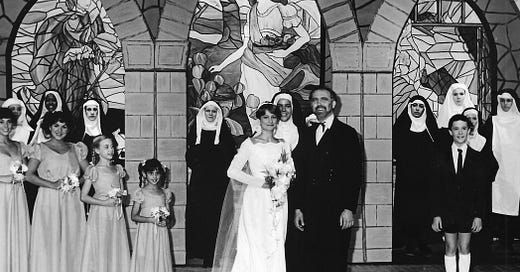



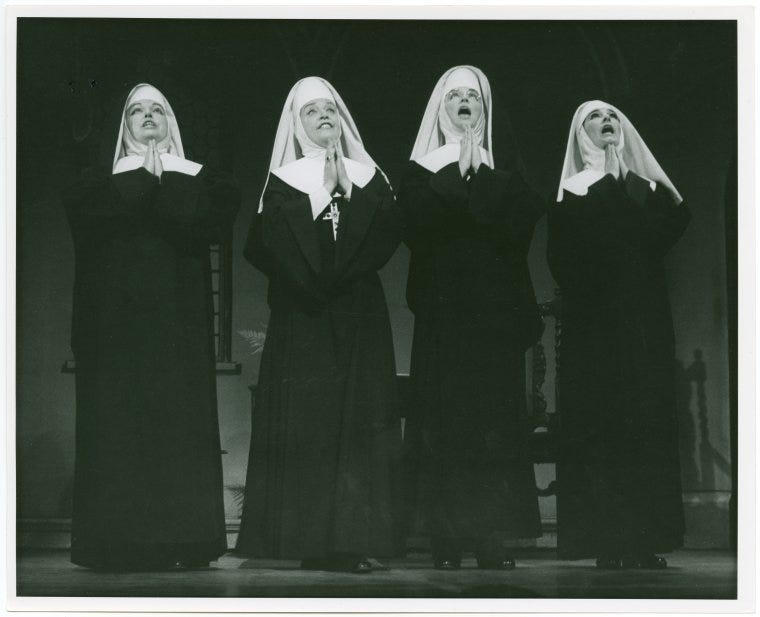
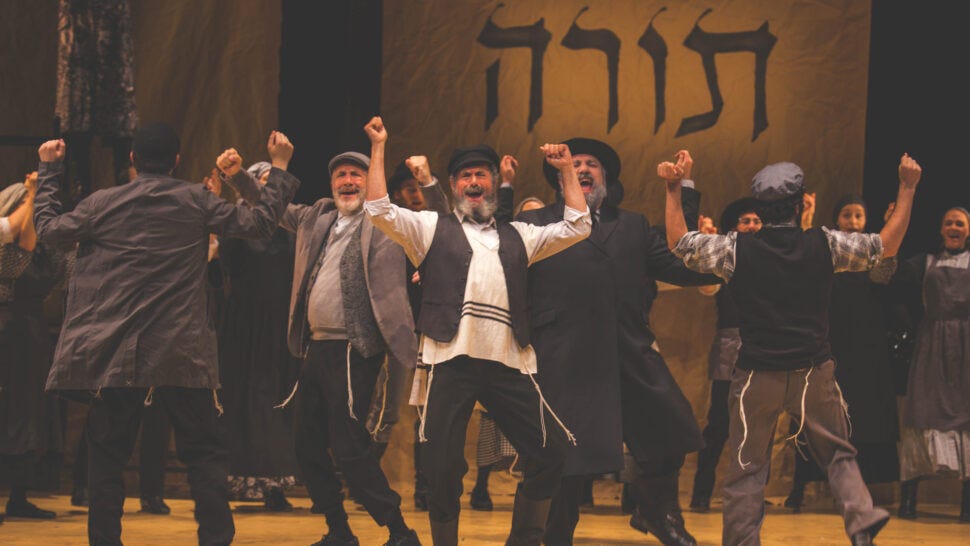
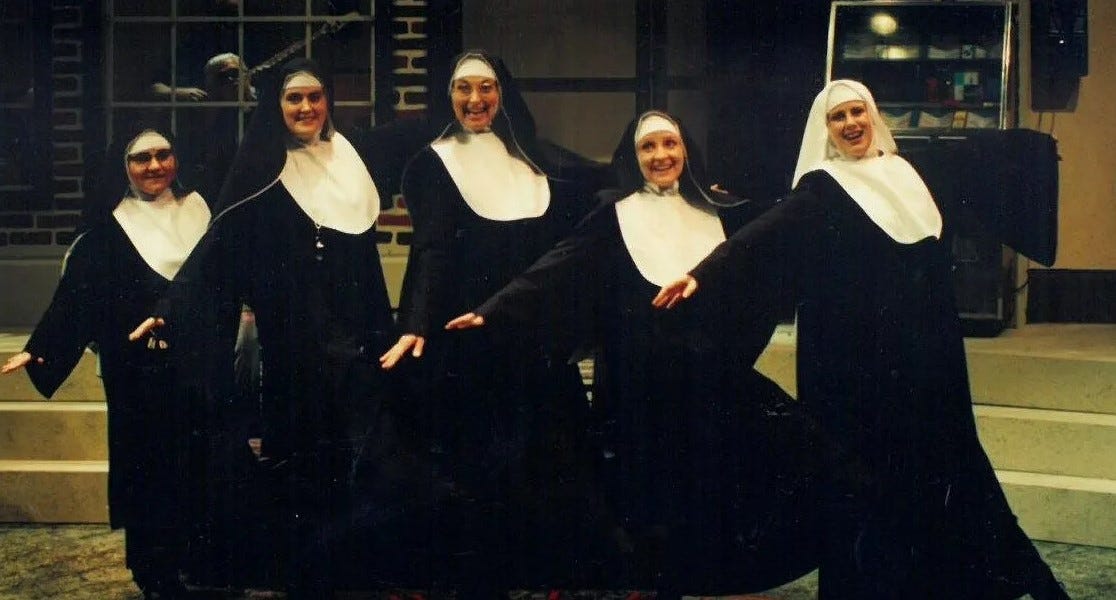
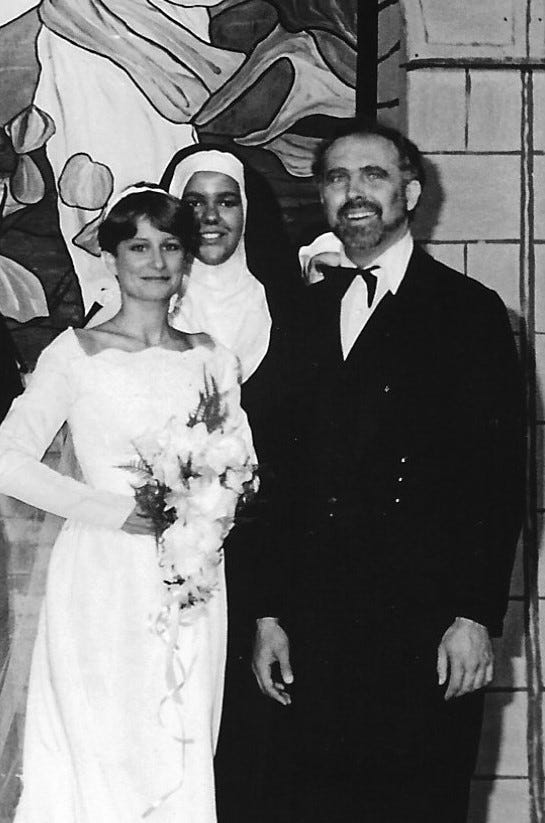
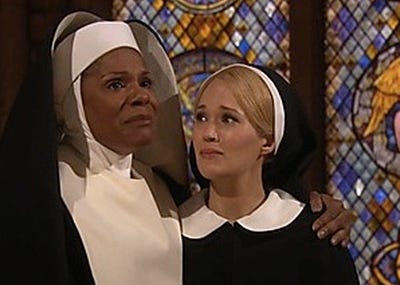
I really enjoyed this piece, thanks for the chuckles.